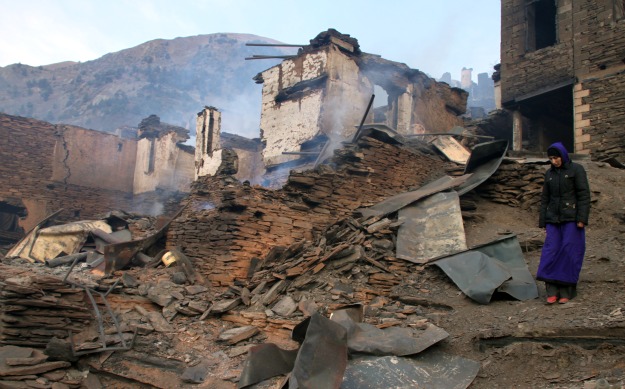
For over a decade, suicide attacks have been a persistent and macabre feature of Russia's battle with militants in the North Caucasus. The suicide bomber who took the lives of 35 people in the arrival hall of Moscow's Domodedovo airport on Jan. 24 provided only the latest chapter in a dark history that, for many Russians, is also the history of Chechnya's struggle for national self-determination. In reality, however, the violence is no longer political -- for the residents of this troubled region, it has become something much more noxious and potentially unsolvable.
Under Vladimir Putin, whose rise to power was intertwined with Russia's second invasion of Chechnya in October 1999, Moscow marginalized the nationalist, secular wing of the Chechen rebel movement. The conflict's unapologetically violent extremists, inspired by the language of global jihad, filled the gap -- allowing the Kremlin to plausibly claim that further negotiations were impossible. The current generation of militants is not motivated by the prospect of a realistic political settlement -- unless the establishment of an Islamic "emirate" in the North Caucasus can be called realistic.
Indeed, many of those fighting in the North Caucasus today articulate their amorphous list of grievances -- corruption, brutal policing, ineffectual local governance, and widespread unemployment, which reaches 50 or even 70 percent in some parts of the region -- in the language of Salafism, Islam's most puritanical religious sect. For most self-proclaimed Salafists in the North Caucasus, Islam offers a salve to the maddening impotency caused by their collapsing economies and broken state structures; for a few, however, religion serves as a gateway to violence. Abuse at the hands of local security forces is often the final trigger for radicalization. As the conflict in the North Caucasus has evolved, it has also spread, especially into the republics of Dagestan, Ingushetia, and Kabardino-Balkaria. The Islamist insurgency of today is not a counter-government force, like the Chechen rebel fighters of the 1990s, but something closer to an entire counter-society. The insurgents' main enemies are not the rulers in distant Moscow but local leaders whom they consider immoral, corrupt, and un-Islamic. A growing number of militant attacks have targeted not Russian officials, but local movie theaters and stores that sell alcohol. That said, these militants still consider dramatic, high-profile attacks in Moscow -- like January's airport bombing -- a legitimate means to strike at the country's political and financial heartland and thus acquire power in the North Caucasus. Local security forces in the North Caucasus have responded to the rise of militant cells -- known asjamaats -- with indiscriminate crackdowns, harassing anyone with a long beard or a skullcap. Young men go missing in "disappearances" and wind up dead in extrajudicial executions, further radicalizing a population that is already alienated from the state and has a long tradition of blood feuds. This past summer, when I traveled to the North Caucasus with researchers from Human Rights Watch, I spoke with the family of Shamil Gaziev, a 22-year-old mentally disabled man accused of helping to plan a suicide bombing in the city of Kizlyar that killed 12 police officers in late March, just 48 hours after two explosions in the Moscow subway left 40 people dead. Masked men with guns came for Gaziev in the middle of the night, taking him to the regional police headquarters. He was held for four days without access to a lawyer or his family being notified. When his lawyer finally saw him, Gaziev had been beaten so badly that he could barely stand, his body was covered in dark, pulpy hematomas, and he appeared to be under the influence of psychotropic drugs. He had confessed to participating in the bombing. At first, he appeared to be the latest victim of Dagestan's incompetent and overzealous police officers, who are under considerable from their superiors in Moscow pressure to "solve" terrorist crimes quickly. http://www.foreignpolicy.com/articles/2011/02/11/has_russia_destroyed_the_caucasus_beyond_repair





















